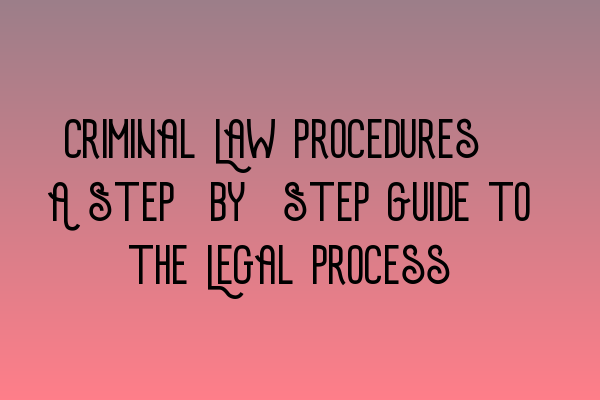Criminal Law Procedures: A Step-by-Step Guide to the Legal Process
As criminal solicitors at SQE Criminal Law & Practice Law UK, we understand that navigating the legal process can be a daunting task. Whether you are involved in a criminal case or simply seeking to enhance your knowledge, this step-by-step guide will provide you with a comprehensive understanding of criminal law procedures. So, let’s dive in!
1. Arrest
The first phase of any criminal case involves an arrest. When law enforcement officers have reasonable grounds to believe that a person has committed a criminal offense, they can arrest the individual. It is crucial to understand your rights and obligations during an arrest, such as the right to legal representation and the right to remain silent. If you’re preparing for your SQE 1 exam, our SQE 1 Practice Exam Questions article will help you test and reinforce your knowledge.
2. Police Investigation
After an arrest, the police will begin their investigation. This stage involves collecting evidence, conducting interviews, and analyzing the facts to build a case. If you’re aspiring to be a criminal solicitor, understanding the investigative process is vital. Our SQE 1 Practice Mocks FLK1 FLK2 article provides valuable insights for your preparation.
3. Charge or Release
Once the police investigation is complete, the suspect will be either charged with a criminal offense or released. If the evidence gathered is sufficient to establish a case, the suspect will be formally charged. On the other hand, if the evidence is lacking or insufficient, the suspect will be released without charges. This critical decision determines whether the case will proceed to court.
4. Bail Application
If the suspect is charged and held in custody, they may apply for bail. Bail allows an individual to be released from custody while awaiting their trial. Understanding the bail application process is crucial for criminal law practitioners, so make sure to explore our SQE 2 Preparation Courses for comprehensive guidance.
5. Trial Preparation
During this stage, both the prosecution and defense prepare their cases. This involves gathering evidence, identifying witnesses, and consulting with legal experts. For aspiring solicitors preparing for the SQE 1 exam, our SQE 1 Preparation Courses can equip you with the necessary knowledge and skills.
6. Trial
The trial is the culmination of the legal process. It is an adversarial proceeding where the prosecution presents its case, and the defense challenges it. The court examines the evidence, hears witness testimonies, and decides whether the accused is guilty or not. Stay up-to-date with the SRA SQE Exam Dates to ensure you’re well-prepared for your qualifying exams.
7. Sentencing
If the accused is found guilty, the court moves on to the sentencing stage. This is where the court determines the appropriate punishment based on the severity of the offense and the circumstances surrounding the case. It’s essential for criminal law practitioners to understand the various factors that influence sentencing decisions.
8. Appeals
In certain cases, the defense or prosecution may appeal the court’s decision. Appeals can be made to higher courts, requesting a review of the trial and questioning the legality or fairness of the previous judgment. The appeals process is crucial for ensuring justice and fairness within the legal system.
Now that you have a comprehensive understanding of criminal law procedures, you can approach your legal journey with confidence. Whether you’re preparing for the SQE exams or seeking professional guidance in criminal law, SQE Criminal Law & Practice Law UK is here to support you.
For more practice materials to enhance your preparation, take a look at our SQE 1 Practice Exam Questions and SQE 1 Practice Mocks FLK1 FLK2 articles. You can also explore our comprehensive SQE 2 Preparation Courses and SQE 1 Preparation Courses to ensure you have the knowledge and skills necessary for a successful career in criminal law.
